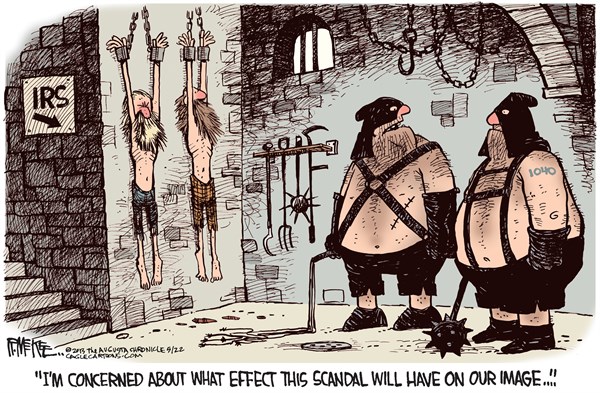The Internal Revenue Service’s tea party targeting program is still withholding approval of 19 organizations’ nonprofit status, nearly a year after the scandal was revealed, the agency’s commissioner testified Wednesday to Congress — where he faced fierce criticism from lawmakers who said he is stonewalling.
John Koskinen, the man President Obama tapped to clean up the embattled agency, also said it will take years to respond to all of the document requests from Congress. He told Congress that even complying with a subpoena for emails from just a handful of key employees couldn’t be done before the end of this year because it takes time to have attorneys delete protected taxpayer information.
Republicans signaled that they are moving ahead with plans to hold former IRS employee Lois G. Lerner in contempt of Congress. They released a memo from the House counsel saying the committee made her aware that it expected her to answer questions at a hearing earlier this month, and that she endangered her legal standing by again refusing to testify.
“The American people believe the IRS is now a politicized agency, because the IRS is a politicized agency,” said Rep. Darrell E. Issa, California Republican and chairman of the House Oversight and Government Reform Committee.
The IRS continues to face scrutiny after an internal audit by its inspector general last year found the agency had improperly singled out conservative and tea party nonprofit applications for special scrutiny and had delayed many of those applications — in some cases for three years.
Nearly a year after the targeting and delays were revealed, however, some groups are still awaiting approval.
Mr. Koskinen said of 145 cases that were part of their “priority backlog,” which meant they had been waiting for at least 120 days as of May, they have closed 126. Most were approved, including 43 that took advantage of a deal the IRS offered in which the groups could agree to keep political activity to less than 40 percent.
Three applications were formally denied, and 25 others dropped their applications or had them canceled when petitioners didn’t respond to IRS questions.
“The 19 cases still open generally fall into one of two categories: either the taxpayer has asked for and received additional time to respond to our questions, or the case is being litigated,” Mr. Koskinen said in his prepared testimony to the committee. “None of these 19 organizations opted to accept the self-certification procedure used by 43 organizations to obtain prompt approval of their applications.”
The IRS didn’t respond to questions seeking the identities of the groups involved. The agency generally argues that it isn’t allowed to share information on specific taxpayers because of privacy rules.
Indeed, those rules are part of the reason the agency says it’s taking so long to provide documents the oversight committee has been seeking.
“What they want is something that’s going to take years to produce,” Mr. Koskinen told lawmakers.
Mr. Koskinen said his agency was preparing to turn over another 20,000 pages of documents later Wednesday, but he warned that orders from Congress could derail those plans.
Just to produce all of the emails from Ms. Lerner could end up going into next year, he said.
That didn’t sit well with Republicans and some Democrats.
“We don’t want the excuses anymore. Prioritize them. Put more lawyers on the job,” said Rep. Jim Jordan, an Ohio Republican who has helped spearhead the committee’s investigation into IRS targeting.
Ms. Lerner, who used to run the IRS division that processed nonprofit applications, has been a key subject of the investigation given emails and other information the committee discovered that, members said, suggested she let her political leanings dictate her official actions.
In a 22-page memo released by Mr. Issa on Wednesday, the House counsel said Ms. Lerner remains subject to contempt of Congress charges after refusing to testify at two hearings, citing her Fifth Amendment rights against self-incrimination.
The oversight committee has ruled that because she made a long statement proclaiming her innocence before asserting her rights, she effectively waived them. The question, however, is whether Mr. Issa properly warned her that by refusing to testify she risked being held in contempt.
The House counsel said she was aware of her obligations, and therefore remains in legal jeopardy.
But Democrats on the committee released a packet of memos and quotes from more than two dozen legal specialists challenging that.
They said Mr. Issa never expressly told Ms. Lerner that the committee rejected her claims of privilege, so she was not properly warned of the consequences of not testifying. They said by adjourning the March hearing without Mr. Issa overruling her claims of privilege, Republicans lost their chance at pursuing contempt charges.
Mr. Jordan at one point accused the IRS of continuing to ask the same kinds of intrusive questions that landed the agency in trouble last year, when an internal audit found it had improperly scrutinized and delayed hundreds of applications.
He offered three examples, including one instance in which the old, objectionable guidance given said the IRS could ask groups to “provide a list of all issues that are important to your organization. Indicate your position regarding such issue.”
In new guidance, the IRS said it could ask applicants to: “Describe how you prepare voter guide(s), including how you determine which issues are addressed in the guide(s).”
Mr. Jordan said the new version sounded too close to the old version, which all sides agreed was too intrusive. “I think the vast majority of people who were harassed over the last three years would agree with my position,” he said.
. . . . . . . . . . . . . . . . . . . . . .
by Stephen Dinan is a writer with The Washington Times.
